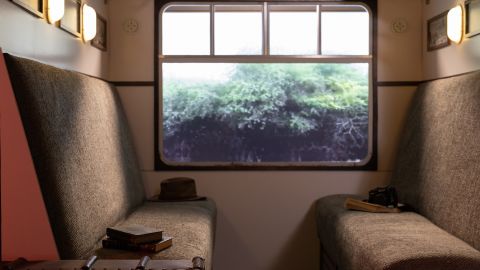Editor’s Note: Call to Earth is a CNN editorial series committed to reporting on the environmental challenges facing our planet, together with the solutions. Rolex’s Perpetual Planet initiative has partnered with CNN to drive awareness and education around key sustainability issues and to inspire positive action.
CNN
—
Film and television have the power to transport audiences to strange and wonderful places. But with that cinematic immersion, there often comes a large environmental cost.
As well as the carbon emissions that come from transport, fuel for the production and accommodation, there’s the environmental impact from the waste produced by building and tearing down film sets. Sets are made from a number of different materials including nails, plywood, timber, and medium-density fiberboard (MDF), which often goes to landfill once a set has been used.
According to a report by Albert, an organization that offers environmental certification for the UK television industry, a typical tentpole film production, with a budget of $70 million or more, uses enough plywood to fill 2.5 cargo planes . The manufacture of plywood can be linked to deforestation, depending on how it is sourced.
“To build these incredible sets takes days, or sometimes weeks or months,” says Chris Gilmour, the director of Vectar Project, a production studio in Manchester, England. “They’re filmed on for two or three days, and then they just scrapped, there’s no way to reuse them.”
To address the problem, Vectar Project creates fully recyclable sets using boards made from cardboard and paper.
Vectar says the boards are made exclusively from timber waste, for example the sawdust and branches left over from timber production, and primarily use water-based adhesives, rather than chemicals such as formaldehyde which are often used in wood-based boards.
According to Vectar, its boards have a carbon footprint 90% lower than that of MDF and three times lower than plywood’s. Because the boards are much lighter than MDF, Vectar says transporting them uses less fuel, which helps reduce their carbon footprint.
“We can produce it locally, it’s a lot lighter to transport, it’s quicker to go together,” Gilmour said.
Although they’re lightweight, Gilmour says the boards are strong enough to hold a person’s weight. While some production designers assume the sets will be like “some kind of horrendous 1970s sci-fi show with polystyrene rocks,” said Gilmour, the material is “indistinguishable from wooden sets until you pick it up.”
Most of Vectar’s recent work has been for commercials for companies such as male grooming brand Old Spice and the UK chain store JD Sports. It also recently developed sets for the long-running UK soap opera Coronation Street and has started building sets for a major Hollywood production, which Vectar said it was not allowed to name.
Recently, there’s been growing scrutiny of the film industry’s environmental impact. An average tentpole film production creates 2,840 metric tons of carbon dioxide, according to Albert. That’s equivalent to the energy used by 358 average US homes in a year. The organization, which is affiliated with the British Academy of Film and Television Arts (BAFTA), is working with the film industry to reduce its carbon footprint.
Some productions have committed to using solar energy for generators and banning plastic bottles on sets. However, film productions are still trying to find other ways of becoming carbon neutral says Gilmour. “There’s an awareness that is needed in the industry, but there’s not a lot of easy solutions,” he adds.
Vectar recently won BAFTA’s Makers and Shakers Award for sustainability, as well as winning the Greening All Work prize at the Ashden Awards, which are run by a UK climate action charity.
Zsófia Szemerédy, Albert’s international manager of film and TV production, says one advantage of Vectar’s lightweight film sets is that they are easier to build than using conventional wood. “You don’t need so many people,” she explained. “You are saving … on energy, on human resources. And that really contributes a lot because that’s the biggest chunk of your carbon footprint,” she added.

Vectar isn’t the only company trying to reduce the environmental impact of film sets. In Los Angeles, Recycled Movie Sets rents out pre-used sets donated by productions that no longer need them and EcoSet also works with productions to reuse and recycle sets
It’s a sign that the film and television industry is attempting to improve its green credentials. In 2019, the movie “1917” became the first large-scale British film to be awarded the highest certification from Albert. Netflix, which produced around 1.1 million metric tons of greenhouse gas emissions in 2020, announced a goal of net-zero emissions by the end of 2022 (Netflix doesn’t include emissions from internet transmission or electronic devices that viewers use to watch the platform).
Gilmour believes Vectar’s sets have a crucial role to play in the industry. “It’s not the only thing in film and TV that needs to change,” he said. “But it is, for the moment, the only truly sustainable solution for set building.”



